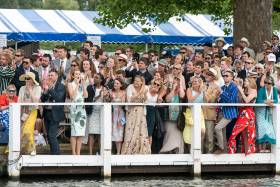Displaying items by tag: Wyfolds
Commercial Rowers Ease to First-Round Win at Henley
#Rowing: Commercial had an easy win in the first round of the Wyfold Cup for club fours at Henley Royal Regatta today. Their opponents, Molesey B, made a mess of the start, veering across towards the Dublin crew and being warned. Commercial’s experienced crew of Mike Corcoran, Fionnán Groome, Colm Dowling and Shane Mac Eoin dealt with it all calmly. They moved into the lead and won, easing up, by one and a half lengths.
They are set to take on Curlew on Thursday.
Henley Royal Regatta, Day One (Irish interest)
Temple (College Eights): Trinity bt Pembroke College, Oxford by 2/3 l; 6 mins 29 sec.
Wyfold (Club Fours): Commercial bt Molesey B by 1½ l; 7:16.
Prince Albert (College Coxed Fours): Deerfield Academy (United States) bt Trinity by 5ft; 6:59.
Fawley (Under-18 Boys’ Quadruples): Clonmel bt Malvern Preparatory School B, United States by 2½ l; 6:55.
Henley Hopes Short-lived for Lady Elizabeth Crew
#Rowing: Henley Royal Regatta did not yield any early joy for Irish crews this morning. In the Wyfold Cup coxless fours, Lady Elizabeth were beaten by Nottingham Rowing Club ‘A’. The English crew cut across from their station at the start and took a lead which they did not relinquish. Lady Elizabeth tried hard in the warm conditions, but their young opponents held on to their lead and won by two and a half lengths.
Henley Royal Regatta, Day One (Irish interest)
Wyfolds (Fours, Club): Nottingham RC ‘A’ bt Lady Elizabeth BC 7 mins 39 seconds, 2½ l.

























































